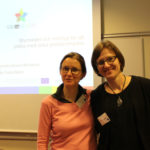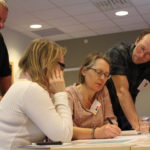2018, April 18: 1st Stakeholder Workshop
The first workshop of the Swedish case study took place on April 18, 2018, at the Clarion Hotel® Gillet in Uppsala, Sweden. The workshop was organized by the Department of Earth Sciences, Uppsala University (UU), and gathered 10 Swedish stakeholders from two municipalities, the Swedish Forest Agency, the Swedish Food Agency, an environmental consultancy company, an NGO and two universities. During the workshop, the SIM4NEXUS project was presented in detail and tools such as thematic models, system dynamics modelling and the serious game were introduced. The workshop aimed at revealing conflicts and synergies between policy goals, assessing interactions between policy instruments and identifying the interactions between national and EU policies. In addition, the conceptual model was discussed and further developed together with the participants. Interesting issues were raised during the workshop. For example, stakeholders emphasized that they would like to see solutions regarding how to reach more synergies (e.g. by applying certain instruments or through a more systemic view on different sectoral issues). Participants also believe that a better education of schoolchildren is necessary to improve the next generation’s understanding of complex interactions within the Nexus.
2018, May 9: Swedish Policy Report
You can download the Swedish policy report that was created under SIM4NEXUS workpackage 2 (deliverable D2.2) here.
The report includes
- a mapping of policy goals and instruments,
- an assessment of policy coherence,
- an evaluation of vertical policy interactions ,
- a summary of formal and informal arrangements adopted to address conflicts, negotiate trade-offs and exploit synergies in practices, and
- an overview of success stories and failures
The reported results are based on
- a review of existing policy documents and scientific literature,
- the assessment of three scientific experts with experience in forestry, biodiversity, energy, water and climate,
- an online survey to 354 stakeholders (101 responses) and
- a stakeholder workshop

